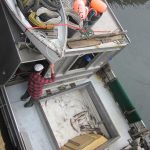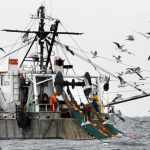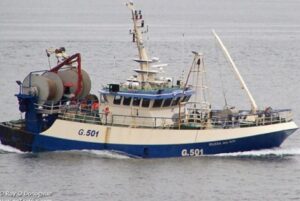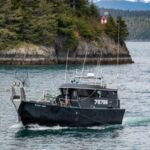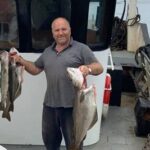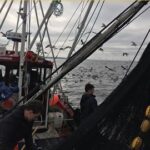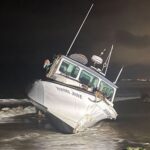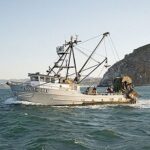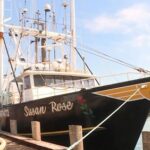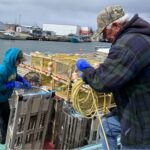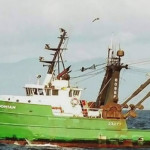Monthly Archives: January 2015
Report: Atlantic menhaden are in better shape than regulators thought
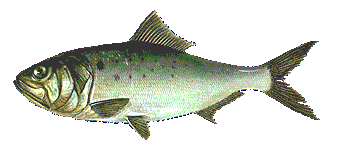 Environmentalists and commercial fishermen have clashed for years over Atlantic menhaden and whether there are still plenty of the little fish left in the sea. Now a draft of a that incorporates more comprehensive data from coastal states stretching back to the 1950s, as well as alternative model scenarios, appears to indicate menhaden might not be in such bad shape after all. Read the rest here 08:00
Environmentalists and commercial fishermen have clashed for years over Atlantic menhaden and whether there are still plenty of the little fish left in the sea. Now a draft of a that incorporates more comprehensive data from coastal states stretching back to the 1950s, as well as alternative model scenarios, appears to indicate menhaden might not be in such bad shape after all. Read the rest here 08:00
Alaska Board of Fisheries Chairman Karl Johnstone has resigned.
 The chairman, whose term was set to be up in June of 2015, confirmed in an email Tuesday that he had resigned his position after being told by Gov. Bill Walker that his name would not be submitted to the Legislature for reappointment. “I offered to step down if it would assist him in getting someone else in place and up to speed,” Johnstone wrote. Read the rest here 21:18
The chairman, whose term was set to be up in June of 2015, confirmed in an email Tuesday that he had resigned his position after being told by Gov. Bill Walker that his name would not be submitted to the Legislature for reappointment. “I offered to step down if it would assist him in getting someone else in place and up to speed,” Johnstone wrote. Read the rest here 21:18
Third phase of BP trial to establish environmental penalties opens with graphic reminders
 Images of oil-coated birds and testimony about “widespread socio-cultural harm” opened the third phase of a trial to establish environmental penalties BP must pay for spilling millions of barrels of crude into the Gulf of Mexico in 2010. The government wants the oil giant to pay another $13.7 billion for harming not just the birds and fish, but the business climate and social fabric of coastal communities. Read the rest here 20:27
Images of oil-coated birds and testimony about “widespread socio-cultural harm” opened the third phase of a trial to establish environmental penalties BP must pay for spilling millions of barrels of crude into the Gulf of Mexico in 2010. The government wants the oil giant to pay another $13.7 billion for harming not just the birds and fish, but the business climate and social fabric of coastal communities. Read the rest here 20:27
New York State Department of Environmental Conservation’s Strong-armed Tactics Taken to Task
 Attorney Daniel G Rodgers held a press conference on Monday at Southampton Town’s Shinnecock commercial fishing dock in Hampton Bays to call attention to what he says is the New York State Department of Environmental Conservation’s strong-armed tactics at dealing with violations by commercial fishermen. According to Mr. Rodgers, Bill Reed, the captain of the Providence was charged,,, Read the rest here 19:08
Attorney Daniel G Rodgers held a press conference on Monday at Southampton Town’s Shinnecock commercial fishing dock in Hampton Bays to call attention to what he says is the New York State Department of Environmental Conservation’s strong-armed tactics at dealing with violations by commercial fishermen. According to Mr. Rodgers, Bill Reed, the captain of the Providence was charged,,, Read the rest here 19:08
Salmon Sperm Could Help Us Recycle Rare Earth Elements
 It’s time to scrape that salmon semen off your plate, because it’s got a much better use than tickling your taste buds (yes, fish sperm is actually a delicacy in Japan). This unusual magical ingredient could help us extract and recycle rare earth elements from ore and a variety of other materials, such as magnets or old electronics. Not only would this process be significantly cheaper than traditional chemical extraction methods, but it’s also much better for the environment. Read the rest here 18:53
It’s time to scrape that salmon semen off your plate, because it’s got a much better use than tickling your taste buds (yes, fish sperm is actually a delicacy in Japan). This unusual magical ingredient could help us extract and recycle rare earth elements from ore and a variety of other materials, such as magnets or old electronics. Not only would this process be significantly cheaper than traditional chemical extraction methods, but it’s also much better for the environment. Read the rest here 18:53
Harper Government Helps Make BC Fishing Industry Safer
 Wai Young, Member of Parliament for Vancouver South, on behalf of the Honourable Gail Shea, Minister of Fisheries and Oceans, announced today that the Government of Canada is investing $262,000 in Fish SAFE, a BC fishing industry driven program that works to improve safety on board commercial fishing vessels. Read the rest here 14:12
Wai Young, Member of Parliament for Vancouver South, on behalf of the Honourable Gail Shea, Minister of Fisheries and Oceans, announced today that the Government of Canada is investing $262,000 in Fish SAFE, a BC fishing industry driven program that works to improve safety on board commercial fishing vessels. Read the rest here 14:12
Dock to Dish Opens Florida’s First Community Supported Fishery
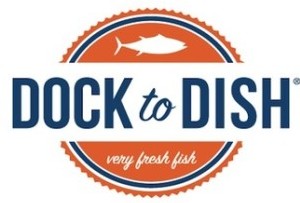 Dock to Dish, the first community and restaurant supported fishery program anchored in Montauk, announced last week it would open Florida’s first ever Community Supported Fishery (CSF) in Key West in February of this year. The program is being developed in conjunction with Key West restaurateur Chris Holland and the Florida Keys Commercial Fishermen’s Association. Read the rest here 14:00
Dock to Dish, the first community and restaurant supported fishery program anchored in Montauk, announced last week it would open Florida’s first ever Community Supported Fishery (CSF) in Key West in February of this year. The program is being developed in conjunction with Key West restaurateur Chris Holland and the Florida Keys Commercial Fishermen’s Association. Read the rest here 14:00
Growing wings for southwest Nova lobster a priority
 Last fall, the Zhangzidao Group, a Chinese seafood giant, purchased a lobster processing plant in Eastern Passage. Its subsidiary – Capital Seafoods International – will be exporting up to 10 million pounds of lobster in the near future. The new owners hired 50 new employees and are turning the plant from a seasonal to a year-round operation, spending between $1.5 and $2 million on upgrades. Read the rest here 12:23
Last fall, the Zhangzidao Group, a Chinese seafood giant, purchased a lobster processing plant in Eastern Passage. Its subsidiary – Capital Seafoods International – will be exporting up to 10 million pounds of lobster in the near future. The new owners hired 50 new employees and are turning the plant from a seasonal to a year-round operation, spending between $1.5 and $2 million on upgrades. Read the rest here 12:23
Florida ‘cracker’ fishermen?
 To the editor: Just to add a little humor to last week’s article, Exploring the Island’s History, Matlacha is described as a cracker fishing village turned artist-colony and the home of pioneering Florida “cracker” fishermen. With that said, my question is, just what is a “cracker” fisherman? Read the rest here 12:06
To the editor: Just to add a little humor to last week’s article, Exploring the Island’s History, Matlacha is described as a cracker fishing village turned artist-colony and the home of pioneering Florida “cracker” fishermen. With that said, my question is, just what is a “cracker” fisherman? Read the rest here 12:06
Canada Q&A – Without massive government subsidies, can the salmon farming industry survive?
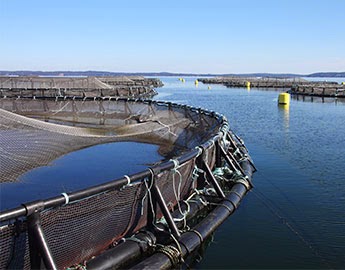 Can the salmon farming industry survive without massive government subsidies,” writes Marike Finlay-de Monch in Port Dufferin, Nova Scotia, “and does a forensic economic analysis show that taxpayers are paying through the nose to pollute their own waters?” National correspondent Mark Hume explains: Read the answer here 11:58
Can the salmon farming industry survive without massive government subsidies,” writes Marike Finlay-de Monch in Port Dufferin, Nova Scotia, “and does a forensic economic analysis show that taxpayers are paying through the nose to pollute their own waters?” National correspondent Mark Hume explains: Read the answer here 11:58
Good lobster year helps boat builders – Video
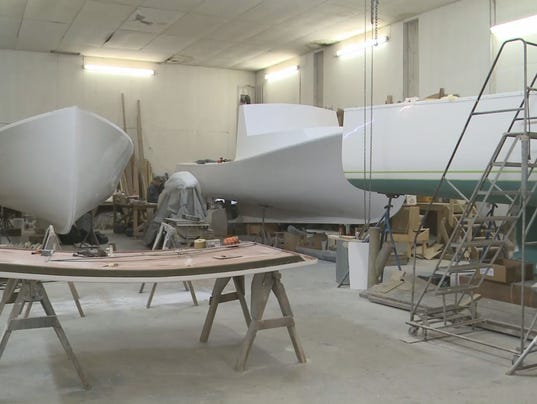 People who work in Maine’s lobster industry have been celebrating after what many say was a good year. The higher incomes mean that after a number of slow years for boat builders, fishermen are once again buying new boats. At Holland’s Boat Shop in Belfast, they said several new boats have already gone out the door and others are under construction. Video, Read the rest here 10:15
People who work in Maine’s lobster industry have been celebrating after what many say was a good year. The higher incomes mean that after a number of slow years for boat builders, fishermen are once again buying new boats. At Holland’s Boat Shop in Belfast, they said several new boats have already gone out the door and others are under construction. Video, Read the rest here 10:15
Medred fell overboard accusing commercial fishermen of not contributing
 Craig Medred’s Dec. 30, 2014, opinion piece “Oil pays the way while extraction giants like fishing and mining skate” was just more of the deceptive bravado and vindictive rhetoric that appears to be his trademark. I can easily buy into Medred’s first few paragraphs pointing out that Alaskans have not let wisdom get in the way of mitigating inevitable declining oil revenues, but the apples vs. oranges comparison of tax rates, royalties and revenues scapegoat commercial fishing in particular and obscure economic realities while further politicizing complex issues. Read the rest here 09:52
Craig Medred’s Dec. 30, 2014, opinion piece “Oil pays the way while extraction giants like fishing and mining skate” was just more of the deceptive bravado and vindictive rhetoric that appears to be his trademark. I can easily buy into Medred’s first few paragraphs pointing out that Alaskans have not let wisdom get in the way of mitigating inevitable declining oil revenues, but the apples vs. oranges comparison of tax rates, royalties and revenues scapegoat commercial fishing in particular and obscure economic realities while further politicizing complex issues. Read the rest here 09:52
A review of the past, the present, and the future of fishers’ knowledge research: a challenge to established fisheries science
 Fishers’ knowledge research is an approach to fisheries research that has a relatively long history, yet has generally failed to become integrated into the fisheries science mainstream alongside approaches that rely primarily on the knowledge of professional scientists. Its continued position on the margins of fisheries science has not however stopped fishers’ knowledge researchers from publishing an expanding literature, which they often use to advocate for the greater consideration of fishers’ knowledge by fisheries scientists and managers. Read the rest here 09:35
Fishers’ knowledge research is an approach to fisheries research that has a relatively long history, yet has generally failed to become integrated into the fisheries science mainstream alongside approaches that rely primarily on the knowledge of professional scientists. Its continued position on the margins of fisheries science has not however stopped fishers’ knowledge researchers from publishing an expanding literature, which they often use to advocate for the greater consideration of fishers’ knowledge by fisheries scientists and managers. Read the rest here 09:35
Commercial fisherman guilty in man’s sea cucumber diving death
Jurors found Joshua J. Wodyga guilty of criminally negligent homicide in the death of Levi Adams, 32, in a trial that ended on Friday in Ketchikan Superior Court, according to The Associated Press. The jury found Wodyga not guilty of manslaughter. Wodyga is scheduled to be sentenced in May. He faces up to 10 years in prison. Read the rest here 08:41
Pressure’s on to help Delta fish suffering amid drought
With populations of numerous endangered Delta fish species at alarming lows, officials in California are planning a number of steps to help them survive if 2015 proves to be a fourth year. The California Department of Fish and Wildlife last week released the results of its annual fall population survey for five key fish species in the Sacramento-San Joaquin Delta. Read the rest here 08:10
Fishing gear and methods – a layman’s guide and reference.
 A great guide for anyone needing a better understanding and knowledge of the different fishing gear and methods in use by fishermen – though foucussed on the Scottish fishing fleets the same methods can be found all round the coast of the UK. A very nice presentation. Read the rest here, and click on the booklet. Very interesting. 20:57
A great guide for anyone needing a better understanding and knowledge of the different fishing gear and methods in use by fishermen – though foucussed on the Scottish fishing fleets the same methods can be found all round the coast of the UK. A very nice presentation. Read the rest here, and click on the booklet. Very interesting. 20:57
Four rescued from sinking fishing vessel near Sitka
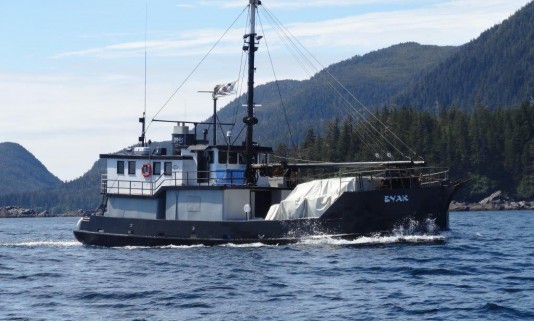 Rescuers picked up four people from a grounded 80-foot tender Monday morning, just before Alaska State Troopers say it sank near the Southeast Alaska town of Sitka. In a Monday AST dispatch, troopers say the U.S. Coast Guard called them for assistance at about 5:45 a.m. after the 80-foot ran aground, then began to take on water about 16 miles south of Sitka. Read the rest here 17:02
Rescuers picked up four people from a grounded 80-foot tender Monday morning, just before Alaska State Troopers say it sank near the Southeast Alaska town of Sitka. In a Monday AST dispatch, troopers say the U.S. Coast Guard called them for assistance at about 5:45 a.m. after the 80-foot ran aground, then began to take on water about 16 miles south of Sitka. Read the rest here 17:02
CETA negotiations suspended over fisheries fund, N.L. says
![]() Newfoundland and Labrador is and all trade agreements currently being negotiated with the federal government. Newfoundland and Labrador says the federal government is not honouring a prior commitment to set up the fund, which it says will be needed to help the seafood industry when a trade deal with the European Union is approved. Read the rest here 12:18
Newfoundland and Labrador is and all trade agreements currently being negotiated with the federal government. Newfoundland and Labrador says the federal government is not honouring a prior commitment to set up the fund, which it says will be needed to help the seafood industry when a trade deal with the European Union is approved. Read the rest here 12:18
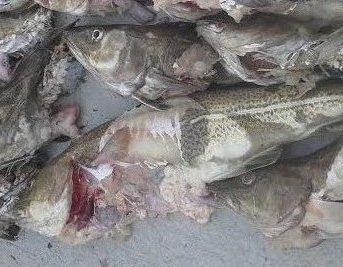
A Must Read! FishNet USA / Dogfish and seals and dolphin, oh my!
The bottom line is that while commercial fishermen from North Carolina to Maine are at work catching on the order of half a million mt of fish and shellfish a year, it appears as if it takes an annual 20,000,000 tons or more to keep all those marine mammals and low-value spiny dogfish and various other predatory fish going. How much of that 20 million tons is commercially/recreationally valuable species or the forage species that sustain them? No one seems awfully interested in finding that out, but they sure should be. Read the rest here 10:55
Eel Farms in Maine? Idea is Gaining Traction
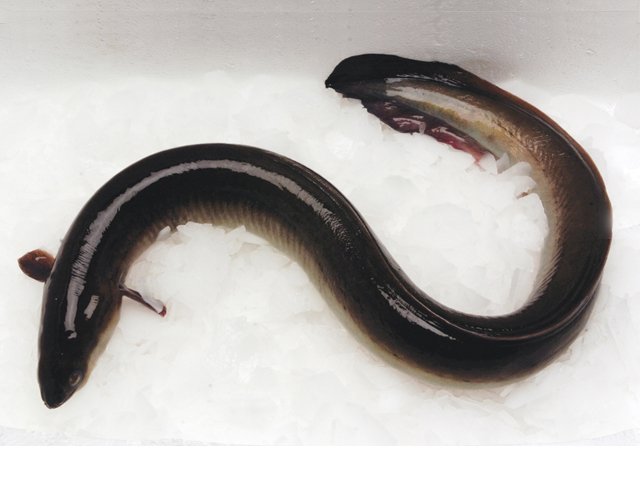 The baby eels they harvest are exported to Asia, where they’re grown to full size in fish farms and sold at a much higher price as sushi products. Barry Costa-Pierce says this is a missed economic opportunity for the Pine Tree State. “So Maine has got, what, over 600 permits out there for harvesting elvers,” he says, “and we’re shipping all of our elvers to China and Taiwan and we’re missing all of that value.” Audio, Read the rest here 09:40:
The baby eels they harvest are exported to Asia, where they’re grown to full size in fish farms and sold at a much higher price as sushi products. Barry Costa-Pierce says this is a missed economic opportunity for the Pine Tree State. “So Maine has got, what, over 600 permits out there for harvesting elvers,” he says, “and we’re shipping all of our elvers to China and Taiwan and we’re missing all of that value.” Audio, Read the rest here 09:40:
US imports more fish from Iceland than any other country,
 “The US is the largest importer of haddock and farmed fish. In 2013 almost 60 percent of salmon and 40 percent of Arctic char was sent there,” Hlynur told RÚV. “I believe there are opportunities for salted fish. We have seen examples of that in Canada.” Read the rest here 09:27
“The US is the largest importer of haddock and farmed fish. In 2013 almost 60 percent of salmon and 40 percent of Arctic char was sent there,” Hlynur told RÚV. “I believe there are opportunities for salted fish. We have seen examples of that in Canada.” Read the rest here 09:27
Cape Wind ending Quonset lease option
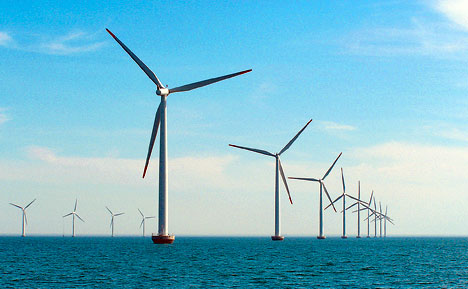 Sources confirmed Friday that Cape Wind Associates LLC has ended payments and an existing lease agreement option with Quonset Business Park in North Kingstown. Ending the agreement option marks another sign of an ailing wind farm company, as Cape Wind took a major blow earlier this month after losing two significant electricity contracts. Read the rest here 09:13
Sources confirmed Friday that Cape Wind Associates LLC has ended payments and an existing lease agreement option with Quonset Business Park in North Kingstown. Ending the agreement option marks another sign of an ailing wind farm company, as Cape Wind took a major blow earlier this month after losing two significant electricity contracts. Read the rest here 09:13
Time to challenge the fisheries oligarchs
 On the fish-catching side of the equation, the federal government distributes fish quotas under the so-called Individual Transferable Quota System (ITQ). It means that a licence holder is issued their own quota every season, the theory being that this avoids “The Tragedy of the Commons” — another euphemism of economists for overfishing. In fact, if the quotas are too high it is still overfishing by another name. Even economists and governments can not beat biological reality although they are experts at explaining away their mistakes. Read the rest here 15:30
On the fish-catching side of the equation, the federal government distributes fish quotas under the so-called Individual Transferable Quota System (ITQ). It means that a licence holder is issued their own quota every season, the theory being that this avoids “The Tragedy of the Commons” — another euphemism of economists for overfishing. In fact, if the quotas are too high it is still overfishing by another name. Even economists and governments can not beat biological reality although they are experts at explaining away their mistakes. Read the rest here 15:30
Alaska’s Bering Sea crab fishery gets underway
 As of Jan. 9, fishermen had harvested 10 million pounds of snow crab, from a 67.95 million pound quota, according to Fitch, who said 42 vessels had participated so far, and more are expected including boats presently fishing for Tanner crab or Pacific cod with the same pots used for crab fishing. She expects that total participation will rise to about 70 vessels chasing snow crab. Read the rest here 13:37
As of Jan. 9, fishermen had harvested 10 million pounds of snow crab, from a 67.95 million pound quota, according to Fitch, who said 42 vessels had participated so far, and more are expected including boats presently fishing for Tanner crab or Pacific cod with the same pots used for crab fishing. She expects that total participation will rise to about 70 vessels chasing snow crab. Read the rest here 13:37
Land & Sea archival extra: 1968 New hand line – Video
 In this 1968 segment, Land & Sea‘s Hal Andrews talks with fishermen about a new technique — the hand line. The fishermen learned it from the Portuguese, and those who were using it were having great success. As one man told Andrews, “It’s a great way to catch a bit of fish.” Watch the video here 11:46
In this 1968 segment, Land & Sea‘s Hal Andrews talks with fishermen about a new technique — the hand line. The fishermen learned it from the Portuguese, and those who were using it were having great success. As one man told Andrews, “It’s a great way to catch a bit of fish.” Watch the video here 11:46
Canada-U.S. delegates meet in B.C. to discuss halibut ‘wastage’ in Bering Sea
 You might say it’s a story about the fish that didn’t get away. Fishermen in the Bering Sea off the coast of Alaska are tossing back millions of kilograms of dead halibut they’ve caught unintentionally while scooping up other stocks. The longtime practice, known as bycatch, has become the focus of intense scrutiny in Alaska and will be the subject of debate at a meeting at month’s end of the International Pacific Halibut Commission in Vancouver. Read the rest here 11:13
You might say it’s a story about the fish that didn’t get away. Fishermen in the Bering Sea off the coast of Alaska are tossing back millions of kilograms of dead halibut they’ve caught unintentionally while scooping up other stocks. The longtime practice, known as bycatch, has become the focus of intense scrutiny in Alaska and will be the subject of debate at a meeting at month’s end of the International Pacific Halibut Commission in Vancouver. Read the rest here 11:13
Alaska Marine Safety Association adds staff and new courses
 New course offerings from AMSEA include an eight and a half-hour Mariner’s First Aid and CPR workshop and a thirty-six hour Wilderness Advanced First Aid workshop. The Mariner’s First Aid and CPR workshop is tailored to the needs of fishermen, mariners and others in remote environments. Attendees receive a U.S. Coast Guard-accepted first aid and CPR certification from American Safety and Health Institute that is valid for two years. Read the rest here 10:54
New course offerings from AMSEA include an eight and a half-hour Mariner’s First Aid and CPR workshop and a thirty-six hour Wilderness Advanced First Aid workshop. The Mariner’s First Aid and CPR workshop is tailored to the needs of fishermen, mariners and others in remote environments. Attendees receive a U.S. Coast Guard-accepted first aid and CPR certification from American Safety and Health Institute that is valid for two years. Read the rest here 10:54
Reuse of Fish Waste Yields Organic Liquid Fertilizer
 With an expanding spiny dogfish catch, AMT BioProducts Inc. is beginning a $685,000 expansion from its current operations at 33 Cape St. into an adjacent 9,100-square-foot plant that is expected to double the company’s production capacity. But AMT BioProducts doesn’t package fish, it processes fish waste into commercial-grade organic liquid fertilizer. Also, an interesting read about the dogfish “stock” and assessment. Read the rest here 10:42
With an expanding spiny dogfish catch, AMT BioProducts Inc. is beginning a $685,000 expansion from its current operations at 33 Cape St. into an adjacent 9,100-square-foot plant that is expected to double the company’s production capacity. But AMT BioProducts doesn’t package fish, it processes fish waste into commercial-grade organic liquid fertilizer. Also, an interesting read about the dogfish “stock” and assessment. Read the rest here 10:42






 Before deciding whether Roughhead Grenadier (Macrourus berglax) will be added to the List of Wildlife Species at Risk, we would like to hear your opinion, comments, and suggestions regarding the possible ecological, cultural, and economic impacts of listing or not listing this species under the SARA., About the Roughhead Grenadier, and Questionnaire: Your comments are important!
Before deciding whether Roughhead Grenadier (Macrourus berglax) will be added to the List of Wildlife Species at Risk, we would like to hear your opinion, comments, and suggestions regarding the possible ecological, cultural, and economic impacts of listing or not listing this species under the SARA., About the Roughhead Grenadier, and Questionnaire: Your comments are important!  Nofima is researching the best ways of using snow crabs as more and more of the species are being caught in the Barents Sea by both Norwegian and Russian vessels. Traditionally, snow crabs have been one of the most important products from Alaska, but with up to 4,000 tonnes of the species being landed in Norway in the past year, Nofima says it’s time to get to know the cold-loving crab.
Nofima is researching the best ways of using snow crabs as more and more of the species are being caught in the Barents Sea by both Norwegian and Russian vessels. Traditionally, snow crabs have been one of the most important products from Alaska, but with up to 4,000 tonnes of the species being landed in Norway in the past year, Nofima says it’s time to get to know the cold-loving crab. 

























